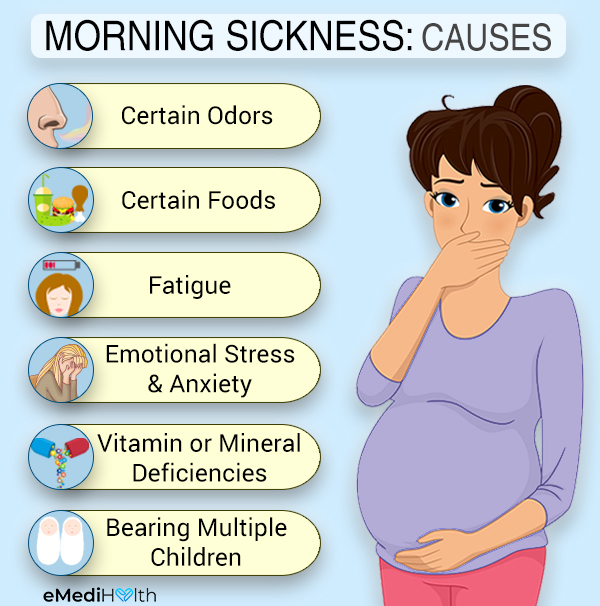In this article:
Morning sickness refers to nausea and vomiting experienced by childbearing women during the first trimester, which is mostly harmless but can be quite unpleasant to deal with. (1)(2)

Almost anything can trigger a spell of morning sickness, even the strong smell of your erstwhile favorite perfume or dish.
How Common Is Morning Sickness During Pregnancy?
More than 50% of pregnant women suffer their fair share of morning sickness, mostly during the first 3 months, but it can sometimes persist for longer. (3)
Possible Causes of Morning Sickness

Some doctors opine that morning sickness is an indication that the placenta, a mass of tissue that connects the mother and the baby, is undergoing sound development.
It is also believed that nausea comes from a response to the increased levels of hormones, including human chorionic gonadotropin (hCG) and estrogen, in pregnant women. (3)
Several factors contribute to morning sickness including:
- Certain odors
- Certain foods
- Fatigue
- Emotional stress and anxiety
- Vitamin or mineral deficiencies
- Bearing multiple children
Signs and Symptoms of Morning Sickness
The classic symptoms of morning sickness include nausea and vomiting, which often appear around the 5th or 6th week of pregnancy. Usually, the symptoms of morning sickness worsen around the 9th week of pregnancy, but they may reduce by the 16th or 18th week.
For nearly 15%–20% of pregnant women, morning sickness lasts until the third trimester. It has also been observed that in 5% of pregnant women, the symptoms of morning sickness may persist until childbirth. (3)
Medical Treatment for Morning Sickness

While mild cases can be tended to with changes in the diet, a case of severe nausea requires medical intervention. Certain medications can be prescribed to a pregnant woman if she does not have any existing medical conditions.
- Vitamin B6 and doxylamine are safe medications that inhibit morning sickness. These can be taken alone or in combination, according to your doctor’s recommendation. (3)
- If vitamin B6 and doxylamine fail to help you, antiemetic drugs may be prescribed to prevent nausea and vomiting. Keeping in mind the side effects, your doctor will choose a drug that best suits your situation.
Diagnosing Morning Sickness
If you’re having a hard time coping with your morning sickness, it is recommended that you seek professional advice from a midwife/GP/ob-gyn to make the experience a little less uncomfortable.
The doctor will take into account your medical history, will inquire about your symptoms, and may even conduct a thorough medical examination before deciding upon the appropriate treatment strategy.
The diagnostic exams and tests include:
- A general health checkup that typically includes an assessment of your body temperature, blood pressure, pulse, and respiratory rate
- Weight measurement
- Urine and blood tests to make sure that your body isn’t dehydrated
- An ultrasound scan to see how far along you are in the pregnancy, as well as to check for twins and molar pregnancy
Risk Factors Associated With Morning Sickness

Morning sickness is thought to be triggered by certain pregnancy-related hormones, but its severity can vary from woman to woman. Some women experience only mild symptoms, whereas others have it far worse.
The exact reason remains unclear, but the following factors can make you more susceptible to morning sickness:
- Previous pregnancy with nausea and vomiting
- Female fetus
- Family history of morning sickness
- History of motion sickness or history of nausea while using contraceptives that contain estrogen
- Young maternal age
- Obesity
- Stress
- Expecting twins or triplets
- First pregnancy
- Migraine headaches
- A rare condition known as a molar pregnancy, in which the placenta overgrows, impeding the development of the baby
When to See a Doctor
Morning sickness is usually mild and passes over time for most women. However, it is imperative to seek professional consultation if:
- You have lost weight of more than 2 pounds or 5% of your pre-pregnancy weight.
- Your heartbeat is irregular.
- You are vomiting more than three times a day, making it difficult for you to retain body fluids or food.
- You experience fatigue and confusion.
- You have been experiencing morning sickness even after the first trimester.
- You urinate less.
If your vomit has blood or is brownish in color, call your doctor immediately.
Expert Answers (Q&A)

Answered by Dr. Sherif Daoud, MD (Obstetrics and Gynecology)
There is some truth to the commonly held belief that pregnant women who experience vomiting and nausea during their gestation period are less likely to suffer a miscarriage as opposed to those who don’t.
According to some studies, morning sickness can be taken as an indicator of optimal fetal growth, but it does not guarantee it. (4) That said, one cannot generalize these findings to all pregnancies. Every woman is built differently and goes through her own experience while bearing a child.
So, even if you don’t have morning sickness or any other symptom that is typically associated with a pregnancy, it does not necessarily mean that you will have a negative outcome. Conversely, women who do exhibit such symptoms are not immune to pregnancy-related complications as well.
Thus, morning sickness in and by itself does not ensure a successful pregnancy but is generally regarded as a positive sign.
Yes, most pregnant women have periodic episodes of morning sickness that typically begin between the 4th and 7th weeks of pregnancy.
In 90% of cases of morning sickness, the symptoms tend to be most pronounced around the 9th week and usually subside by the 20th week. In the remaining 10% cases, the symptoms may follow an unconventional or unpredictable trajectory with either persistent or fluctuating symptoms.
Bizarre as it may sound, but yes, men can also go through many of the pregnancy symptoms without actually bearing a child. This phenomenon is referred to as the couvade syndrome or sympathetic pregnancy.
A healthy male may mimic the behavior and symptoms of his pregnant female partner, which includes some degree of morning sickness, as well as other symptoms such as food cravings, backache, increased irritability, depression, cramps, fainting spells, and fatigue.
In fact, some men even undergo noticeable physical changes that are akin to the expectant mother, such as weight gain and increased fat accumulation around the abdomen that resembles a “baby bump.”
Most cases of morning sickness are easily manageable at home without the need for any medical intervention.
Although anti-sickness drugs are available, you should try a few simple self-care measures before resorting to medication.
When you are having trouble keeping down your food, its best to consume small-sized meals that are high in carbohydrate and low in fat. Potato, pasta, and rice are all good options. You can even munch on plain biscuits or crackers if you are not in the mood for anything heavy.
You should steer clear of strong-smelling foods that can send your gag reflex into overdrive. These usually include hot and spicy foods. Identify any other food or smell that repeatedly aggravates your nausea and vomiting, and stay away from it.
Have your dinner at least a few hours before bedtime so that your body gets enough time to process it before it goes into slumber mode.
Consuming ginger products may help relieve some of the symptoms associated with morning sickness, but some women have reported experiencing digestive trouble as a result of it.
You can also speak to your doctor about trying complementary therapies, such as acupressure or acupuncture, and see if they are suitable for your case.
If your symptoms fail to subside despite adequate self-care and keep you from accomplishing your daily activities, you must consult your midwife/GP/doctor for the appropriate treatment. In all probability, the doctor will prescribe an anti-sickness medication that is safe to take during pregnancy.
Final Word
To ease the symptoms of morning sickness, take your vitamins, rest properly, eat your breakfast, and use aromatherapy.
The obvious discomfort aside, morning sickness is rarely a cause for concern and usually resolves by the time your pregnancy enters its 20th week.
However, persistent nausea and vomiting during pregnancy can be alarming as these can lead to dehydration and weight loss, especially if it is accompanied by stomach pain or if it begins late into the pregnancy, that is, 10 weeks after the onset of pregnancy. Seek immediate medical review to ensure your health and that of your baby.

- Was this article helpful?
- YES, THANKS!NOT REALLY


